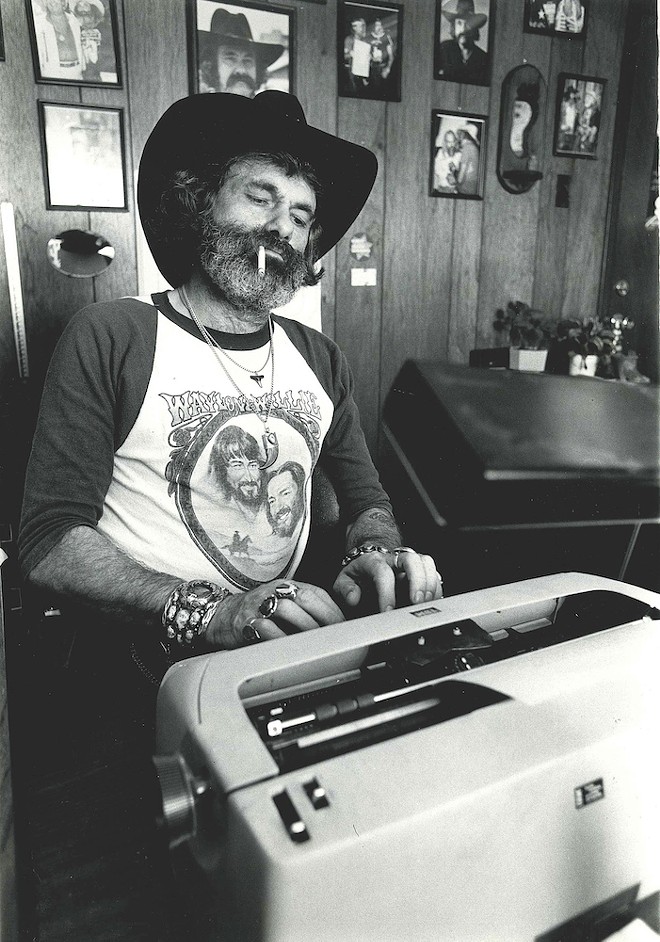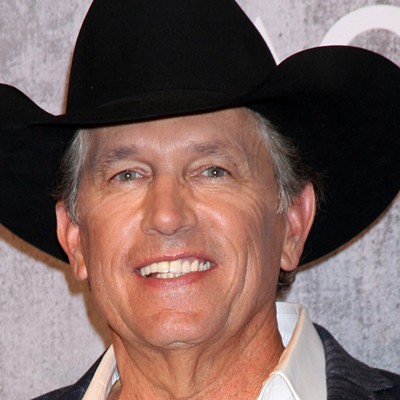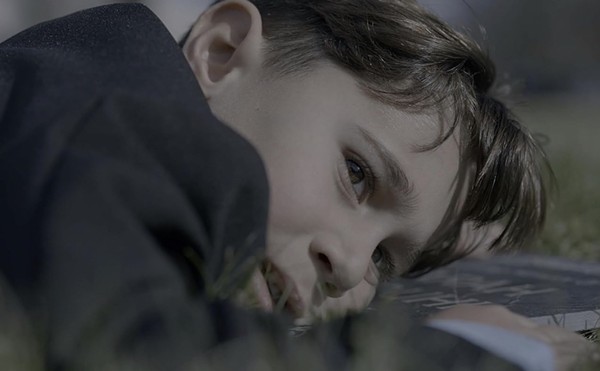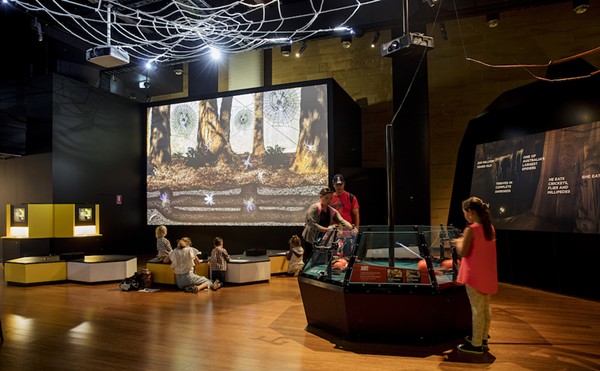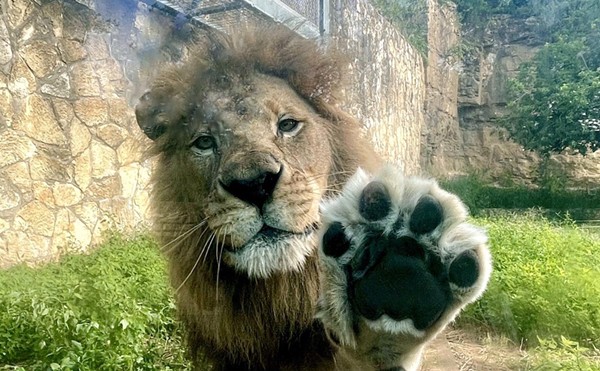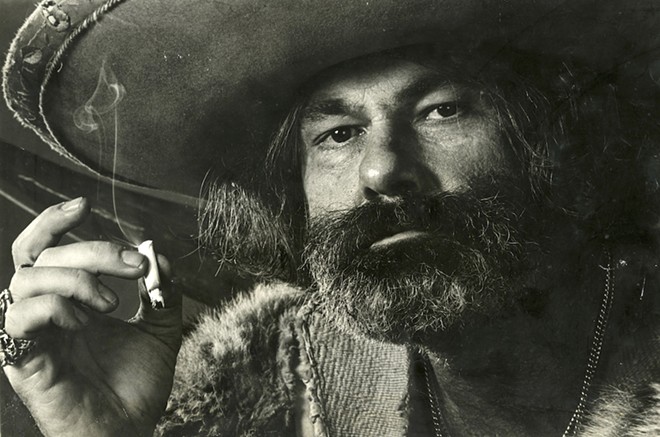
As a close friend to legendary performers such as Augie Meyers, Willie Nelson, Jerry Jeff Walker, Leon Russell, David Alan Coe and countless others, Kindrick documented the rise of “outlaw country,” the movement that crossed the paths of shit-kicking rednecks and pot-smoking hippies. In documenting it, Kindrick became an outlaw himself.
“I love the guy,” said Meyers, the San Antonio legend known as a founding member of both the Sir Douglas Quintet and the Texas Tornados. “He’s a wild man. Always great vibes. But wild.”
Kindrick’s legacy is getting new attention thanks to the release of Outlaw Country Reporter: Misfits, Madams, and Hangin’ with Willie, a memoir recently released by Texas A&M University Press. A special event is planned for Nov. 3 at Texas State University’s Wittliff Collections which will include a reading by Kindrick, performances by Augie Meyers and the Krayolas, among other surprises.
“Sam is a Hunter S. Thompson-type figure,” said Hector Saldana, head of the Wittliff Archives, which recently purchased Kindrick’s papers. “But he was gonzo before Hunter! They’re on the same path, though. Sam was a chronicler of such an important time. That’s why his was one of the first collection I sought for the Wittliff Archives.”
Kindrick started his journalism career in San Angelo before moving to the San Antonio Express, where his “Offbeat” column documented the city’s unique characters and anti-heroes. That early work even earned a Pulitzer nomination.
“I was always drawn to the weird and the unusual,” Kindrick told the Current in discussing his memoir. “People like to read about the down-to-earth, the downtrodden. Unknown-type people that folks can identify with.”
As Kindrick documented those on the margins, he became one of them, transitioning from clean-cut country boy into an “outlaw journalist” with long hair, a scraggly beard and a dizzying array of silver jewelry. Along the way he also picked up a major drug habit.
After being fired from the Express-News in 1973, Kindrick founded Action Magazine, a feisty free newspaper remembered as equal parts brilliant and hilarious. Despite getting swallowed by his addictions, Kindrick never lost his newspaperman’s instinct to cut through the bullshit.
In the ’80s, a much-publicized drug bust landed Kindrick in jail, where he finally turned around his life and got clean. Now 25 years sober, he speaks to AA groups about his journey — a rollicking ride of transgression and redemption.
Kindrick’s turns of phrase are often laugh-out-loud hilarious and hearken back to an older era — as if Will Rogers had been absorbed in the ’60s countercultural explosion.
“He is a connection to not only a time but also a type of person that existed, and that includes Willie Nelson and Kinky Friedman and Hondo Crouch,” Saldana said. “Sam is of that era. He is a connection to a Texas that really doesn’t exist anymore.”
Red and Elvis
Kindrick grew up in Junction, nearly two hours northwest of the Alamo City. After losing his birth father as an infant, he was raised by his highly religious mother — a strict schoolteacher who would later frown on his misadventures and addictions.
Kindrick found an early father figure in Red Smith, an old-school cowboy who taught him to shoot a rifle and “never take any shit from anyone,” according to his memoir. He described Smith as “a venerable, toothless, two-fisted, Hill-Country cowboy who would ride his horse to donnicker before he would walk.”
Thanks to his rural upbringing, Kindrick grew up on the land, riding horses and keeping wild animals as pets. His inimitable writing voice is an echo of that older world but combined with more modern influences. As a youth, he read J.D. Salinger’s Catcher in the Rye three times.
Kindrick started college at Sul Ross in Alpine, where he met a young Elvis Presley and his band. They performed in the town’s high school auditorium as a benefit for the Alpine Future Farmers of America.
“It was 1955 and West Texas college girls were all but coming out of their undies in a high school auditorium,” Kindrick wrote. “Who in the hell told them they could shuck their britches? Presley was doing his pelvic palpitations that no modern day dick dancer has ever been able to emulate.”
Such passages — full of fire, humor and ferocity — animate Kindrick’s book and make it an essential Texas read.
Kindrick kicked off his writing career while at Sul Ross, and in an appropriately outlaw manner — he was busted penning papers for other students at $10 apiece. The professor who popped Kindrick spared him spared the punishment but told Kindrick he was wasting his time at Sul Ross and encouraged him to enroll in Southwest Texas — now Texas State — as a journalism major.
Kindrick’s first story writing for his new university’s school paper involved interviewing a “half-naked female with hair scorched in a student housing fire,” he recalled in his memoir. Readers loved the story, and so the journey began.
Newspaperman
After graduation, Kindrick jumped from one small newspaper to another. While in San Angelo, he wrote alongside famed Western author Elmer Kelton, who penned a farm-and-ranch column, but it was another coworker who nudged him in his ultimate direction.
“Write your articles about the losers and off-color characters of this world,” his city editor, Tom Steph, told him. “People get sick of hearing about the winners. There is a little loser in all of us, and we can all identify. So many of us are a little odd, a little off-whack, a little removed from the beaten path.”
That focus on marginal characters ultimately became the focus of “Offbeat,” Kindrick’s Express column. Some installments of “Offbeat” were later compiled into his first book, Best of Sam Kindrick: The Secret Life and Hard Times of a Cedar Chopper.
‘The nightlife ain’t no good life’
While seemingly a clean-cut member of the mainstream community, Kindrick had already begun a journey into the heart of the Alamo City’s nightlife.
“San Antonio has always been an after hours city,” he explained in Outlaw Country Reporter.
Among his favorite haunts was the Eastwood Country Club, Johnny Phillips’ East Side juke joint, a Chitlin Circuit stop for artists including Ike and Tina Turner, Fats Domino and Etta James. Liquor wasn’t allowed, but patrons would smuggle in bottles so they could mix drinks with “setups” provided by the club.
“Owen Kilday was a sheriff back in those days, and he and Phillips had a deal worked out where they could operate after hours,” Kindrick remembers. “Gatemouth Brown was the fucking house musician out there then! That son of a bitch ... you talk about a guitar player. Miss Wiggles was out there too. She danced standing on her head in a chair and could absolutely make every muscle in her body move at the same time.”
During those years, Kindrick also spent time in Crystal City, an impoverished South Texas town experiencing labor and racial upheavals. His dispatches on the strife earned a Pulitzer nomination. Ironically, Charlie Kilpatrick, the man who had him nominated, fired him a few years later.
It was the era of smoky newsrooms filled with clacking typewriters, where writers would sneak sips of whiskey before filing stories. But that era was coming to an end, especially as Rupert Murdoch of Newscorp and Fox News notoriety, bought the Express in 1973, merging it with the Evening News to create the Express-News.
“Murdoch bought the paper and I was fired within eight hours,” Kindrick said. “I knew it was coming. But I was so sick of that scene ... and Charlie Kilpatrick. He was a fucking joke, just an absolute total joke.”
Kindrick later became a DJ at newly launched KEXL-FM, where he was known as the “long-haired redneck.” While on air, he frequently ridiculed Charlie Kirkpatrick and “his little tin-soldier Texas Cavaliers suit,” as ongoing retribution for his firing.
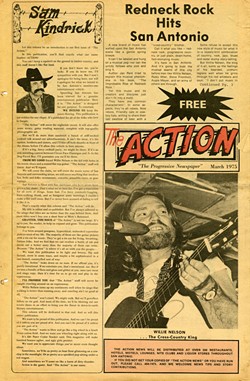
Back in Action
Undaunted by his firing and unwilling to give up writing, Kindrick started Action Magazine, a free alternative newspaper that covered the wide swath of SA nightlife with an emphasis on music. Now that the leash was fully off, Kindrick let fly with his uniquely colorful language, covering anyone from Texas stalwarts including Kinky Friedman and Augie Meyers to unknown local musicians. However, he always had an eye towards documenting unique characters — not just critiquing the music.
“I never was a critic,” Kindrick said. “Who am I to pass judgment on somebody’s fucking talent? I don’t give a fuck what some asshole in Austin thinks about something I’ve written. … What difference would it make what I think? I can’t play a guitar worth a shit.”
Among those Kindrick covered was Willie Nelson, who graced the first Action cover. Kindrick had given Nelson ample ink while still at the Express, and the two grew close enough that the writer joined Willie’s entourage and eventually emceed two of the singer-songwriter’s first picnics. They were also drinking buddies in the days when Willie lived in Bandera.
“The Bandera rednecks started giving Willie’s kids a hard time,” Kindrick said. “That’s why he hoofed it to Austin. Too bad, too. He could have done a lot for the San Antonio scene.”
Among the bars Nelson enjoyed was the Foxy Lady on Perrin-Beitel Road.
“He had the hots for one of the waitresses over there,” Kindrick said. “That’s when he put together the monster platinum album Red Headed Stranger, and we stopped over at Foxy Lady’s and I sat there and listened to that whole damn album in the parking lot and told him, ‘That thing ain’t gonna sell.’”
Kindrick’s time in the Willie entourage came to an end not long after. Not because of a falling out with the musician, but because he accidentally smoked PCP, according to his memoir. While under the influence, he met the devil, who was wearing a cowboy hat and had pimples oozing purple pus. Kindrick wrote that he brought himself back down to earth by eating a dozen hot dogs.
Persona
As Kindrick moved from the daily paper to Action, his appearance changed as well. Much like the outlaw country musicians he wrote about, Kindrick grew out his hair, started wearing jewelry and stopped shaving.
“He had the jewelry and beard, the hippie stuff,” Meyers said. “But he always seemed like a farmer to me. A country boy, like me. With his beard and his character and voice … he always reminded me of Gabby Hayes, the old Western movie star who was in movies with John Wayne and Roy Rogers.”
The Wittliff’s Saldana said that persona allowed him to move in a variety of circles.
“He had fun with it. Who has the courage to do that?” Saldana asked. “I’m gonna go, you know, hang out with these guys, the bikers and the hardcore people. He had guts. He’s fearless. He walks the walk, talks the talk, and you know, he doesn’t really make too much apologies for it.”
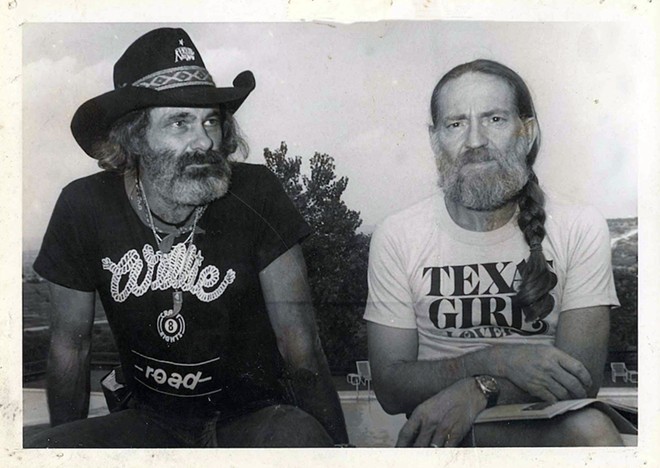
Kindrick’s unconventional look even earned him a part in Steven Spielberg’s first film, Sugarland Express, filmed in and around San Antonio. Kindrick details the on-set escapades in one book chapter, claiming that co-star Goldie Hawn, seen wearing a Hemisfair sweatshirt in the flick, was a “total pothead.”
Outlaw Country Reporter also documents Kindrick’s encounters with other colorful characters, among them Hondo Crouch, the champion swimmer who founded Luckenbach, Texas; San Antonio pimp and gangster Bunny Eckert; and perhaps, most notorious of them all, Theresa Brown, a famous madame who ran a brothel out of a nondescript Castle Hills home and counted prominent politicians and businessmen among her clientele.
When Kindrick held his first World Menudo Cookoff in Raymond Russell Park, Brown reportedly showed up in a bus with the phrase “Hot Pants Menudo” emblazoned on the side.
“I said, ‘Theresa, you crazy bitch, you’re gonna get us all busted,’” Kindrick remembered telling her. “And she said, ‘Fuck you, man. I know more about menudo than you do.’”
Redemption arc
As the freewheeling ’70s skidded into the ’80s, Kindrick’s addiction transitioned from weed to shrooms to cocaine to his final drug of choice: meth. He consumed an “8-ball” every two days. Because he snorted the drug rather than injecting it, Kindrick convinced himself he wasn’t a junkie.
Bexar County Sheriff Harlon Copeland wasn’t so convinced. After writing articles critical of the police for years, Kindrick became a target for the law-and-order Copeland.
When Kindrick’s bust went down, every TV and radio station was on hand to document the proceedings. After his second arrest a year later, Kindrick faced a quandary — either rat out his drug dealer or go to jail. Fearing the wrath of his criminal associates and remembering the advice of Paul English, Willie Nelson’s drummer, Kindrick chose jail. He’d hit rock bottom.
“I was looking at pure death when I went in [jail],” Kindrick said. “I’d lost everything. I’d lost my family, I’d lost my wife, I’d lost my job, I had no self- respect. I didn’t give a shit for myself. I’d lost myself.”
Kindrick survived in the Bexar County Jail thanks to an older inmate nicknamed “The Wizard,” who not only showed him the ropes but inspired him with nightly prayers and religious faith. While praying, Kindrick swore to never take another drug or another drink if he could find his way out.
When it came time for sentencing, Kindrick faced the notoriously tough Judge Susan Reed, but what followed was something he dubbed the “Miracle of the 144th District Court.” Kindrick’s substance abuse group, populated by successful businessmen and respected members of society, testified about his character and recovery. As a result, he was released back into society with a monthly drug test the only requirement.
But his trials were far from over. Kindrick lost his eldest son, Grady, to suicide, and his second son, Steven, to lung cancer. Kindrick got cancer himself — and beat it.
Despite nearly nine decades of ups and downs, don’t expect moralizing platitudes from Kindrick — either in Outlaw Country Reporter or in person. Even in his current life of sobriety and faith, he still has an unmistakable edge and a reverence for his longtime wife Sharon.
“No, I don’t know what the fuck everything means,” Kindrick said. “I’ve had a lot of good things happen, I’ve had a lot of bad things happen. I’ve lost two sons, that’s in the book. But my wife, I’ve had a wonderful life with her since we’ve been married some 30 some years ago, and still it’s still going and still good.”
Kindrick and Sharon now live a peaceful life in Bulverde — gardening, birding, enjoying every moment. He also speaks at AA meetings, helping those on a path similar to his own.
“What’s amazing about Sam’s story is ... it’s a survival story,” Saldana said. “There was always a humanity to Sam. He’s gone through a lot of pain, like we all do in life, but he’s still going ... and he’s inspirational. There is redemption there.”
And Kindrick himself remains inspired.
“I’ve never been happier than I am now,” he said. “And being able to share my life, whether it’s in a book or whatever, if it can help anybody, that’s what I’m supposed to do.”
Subscribe to SA Current newsletters.Follow us: Apple News | Google News | NewsBreak | Reddit | Instagram | Facebook | Twitter| Or sign up for our RSS Feed

